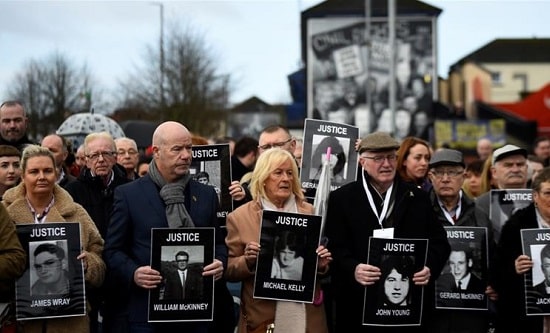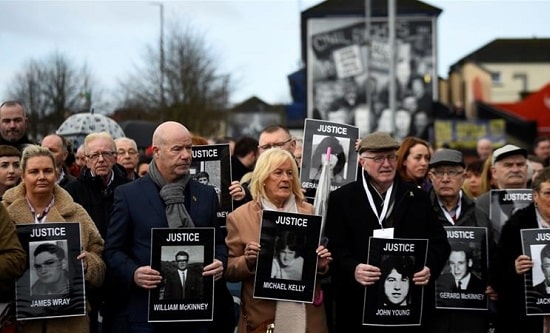
On 14 March 2019 the Public Prosecution Service (PPS) announced that just one of 17 British soldiers involved in the 1972 slaughter of peaceful protesters in Derry in the north of Ireland would face trial. This announcement was the latest in a long line of abuse and insult to the victims, survivors and families of Bloody Sunday.
The march through Derry on Sunday 30 January 1972 took place following escalating repression in the three years since British troops were sent to the north of Ireland in 1969, and was in specific response to the policy of mass internment without trial introduced in 1971. British soldiers from the notorious Parachute Regiment opened fire on the march, shooting 28 unarmed people; 13 died at the scene and a 14th four months later from his injuries.
The PPS says there is sufficient evidence to prosecute ‘Soldier F’ for the murders of James Wray and William McKinney, and attempted murders of Patrick O’Donnell, Joseph Friel, Joe Mahon and Michael Quinn in Derry. None of the 16 other soldiers against whom it was considering whether charges would be laid will face trial.
In the week before the PPS announcement, Conservative Northern Ireland Secretary Karen Bradley told the House of Commons that nothing done by British soldiers in the north of Ireland constituted a crime and that the killings by troops were ‘people acting under orders and instructions, fulfilling their duties in a dignified and appropriate way’. Bradley was forced to apologise but has kept her job.
This development is the conclusion of a process which began in 1998, when – following years of sustained pressure from the people of Derry and their supporters – the British government commissioned the Lord Saville Inquiry into the events of Bloody Sunday. The report from that Inquiry was finally published in 2010. As we reported in FRFI August/September 2010:
‘The report took 12 years to complete, cost £195 million and runs to over 5,000 pages. Press coverage concentrated on two things: Prime Minister Cameron’s apology and the cost to the British taxpayer. What was more important, however, was that Saville, like Widgery before him, exonerated the British government – this time the blame was placed on individual soldiers. The outcome is what the British imperialist state wanted – it is free to do the same again when necessary.’
Not only did the Inquiry put the blame on the individual soldiers alone, it also made clear to all the former soldiers who gave evidence that their testimony would not be used in any further criminal prosecution.
Soldier F gave his evidence in 2003 and admitted firing 13 rounds on Bloody Sunday. He told the Inquiry that the people who were killed were ‘gunmen and bombers’. The Inquiry made it clear that this was not the case and concluded that there was ‘no doubt’ Soldier F had shot unarmed father-of-six Paddy Doherty and then shot Bernard McGuigan, as he went to help Patrick Doherty, waving a white handkerchief.
The announcement that after years of judicial and criminal inquiry into the shooting of 28 unarmed people on a peaceful demonstration, just one British soldier would face trial in a non-jury court, was made on the 28th anniversary of the release of the Birmingham Six. The Six had served 16 years wrongful imprisonment for IRA bombings they had nothing to do with. In pursuit of its continued occupation of the north of Ireland, the British state was very quick to prosecute these innocent Irishmen. That speed is in stark contrast to its avoidance when it comes to bringing to book its own killers in uniform.
Nicki Jameson




